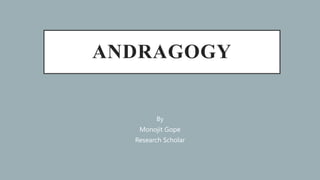
Andragogy.pptx
- 2. WHAT IS ANDRAGOGY? Andragogy is a theory of adult learning that was developed by Malcolm Knowles in the 1960s. It is based on the idea that adults are different from children and adolescents in terms of their learning needs, motivations, and experiences.
- 3. HISTORY OF ANDRAGOGY The term "andragogy" was first coined by Alexander Kapp in 1833. Kapp was a German educator who believed that adults learn differently than children. He argued that adults are more self-directed, have more experience, and are more motivated to learn when they see the relevance of the learning to their own lives.
- 4. KEY CONTRIBUTORS • Here are some of the key contributors to the development of andragogy: Alexander Kapp (1833): Coined the term "andragogy" and argued that adults learn differently than children. Malcolm Knowles (1960s): Developed four key principles of andragogy that are still widely used today. Jack Mezirow (1970s): Developed the concept of transformative learning, which is a central tenet of andragogy. Sharan Merriam (1980s): Conducted extensive research on adult learning and published several influential books on the topic.
- 5. ASSUMPTIONS OF ANDRAGOGY • There are five key assumptions underlying andragogy: Adults are motivated to learn by their own needs and interests. Adults have a wealth of experience that can be used as a resource for learning. Adults are more self-directed than children and adolescents. Adults need to know why they are learning something before they can learn it effectively. Adults prefer to learn in an active, participative way.
- 6. PRINCIPLES OF ANDRAGOGY • There are seven principles that are central to andragogy: Adults need to be involved in the planning and evaluation of their learning. Adults need to be presented with information in a way that is relevant to their own experiences and interests. Adults need to be encouraged to reflect on their own learning. Adults need to be given opportunities to practice what they have learned. Adults need to be given feedback on their learning. Adults need to be given opportunities to collaborate with others in their learning. Adults need to be given opportunities to celebrate their learning achievements.
- 7. HOW TO APPLY ANDRAGOGY IN THE CLASSROOM Provide opportunities for adult learners to take ownership of their learning. Use experiential learning activities that allow adult learners to apply their knowledge and skills in real-world situations. Pose problems for adult learners to solve. Encourage adult learners to share their experiences and insights with each other.
- 8. BENEFITS OF USING ANDRAGOGY Increased motivation and engagement. Improved retention of information. Increased problem-solving skills. Enhanced creativity and innovation.
- 9. ANDRAGOGY AND PEDAGOGY Andragogy is often contrasted with pedagogy, which is a theory of child learning. Pedagogy is based on the idea that children are empty vessels that need to be filled with knowledge by their teachers. Andragogy, on the other hand, is based on the idea that adults are active learners who are responsible for their own learning.
- 10. ANDRAGOGY IN PRACTICE Andragogy can be used in a variety of settings, including formal education, training, and workplace learning. In formal education, andragogy can be used to design courses that are more relevant to the needs and interests of adult learners. In training, andragogy can be used to develop programs that help adults acquire the skills and knowledge they need to do their jobs. In the workplace, andragogy can be used to create a learning environment that supports adult learners.
- 11. ANDRAGOGY VS PEDAGOGY Characteristic Andragogy Pedagogy Learner motivation Intrinsic motivation (motivation to learn comes from within the learner) Extrinsic motivation (motivation to learn comes from outside the learner, such as rewards or grades) Learner role Self-directed learner (the learner takes responsibility for their own learning) Dependent learner (the learner relies on the teacher to direct their learning) Learning style Experiential learning (the learner learns by doing) Reflective learning (the learner learns by thinking about what they have done) Teaching methods Problem-based learning, project-based learning, experiential learning Lecture, discussion, drill and practice
- 12. CONCLUSION Andragogy is a valuable theory of adult learning that can be used to improve the effectiveness of education, training, and workplace learning. By understanding the assumptions and principles of andragogy, educators and trainers can create learning experiences that are more relevant, motivating, and effective for adult learners.
- 13. THANK YOU
